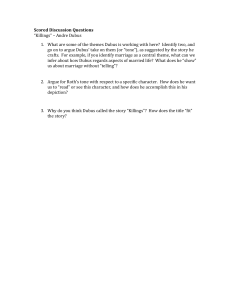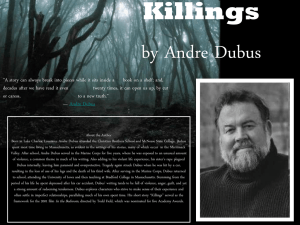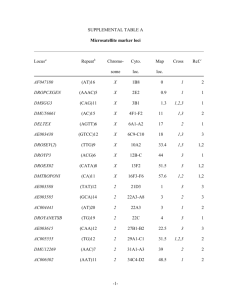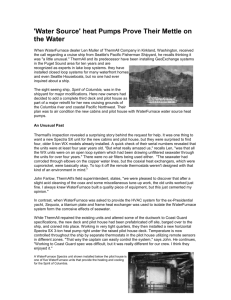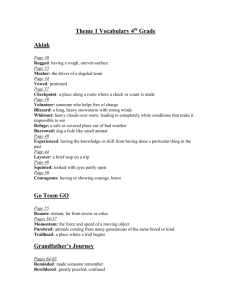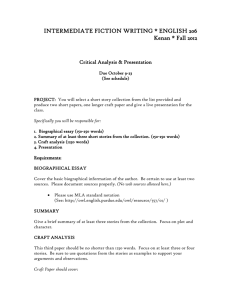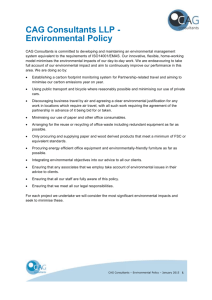Mr. Claro -- Modern Nonfiction Reading Selection by Andre Dubus
advertisement
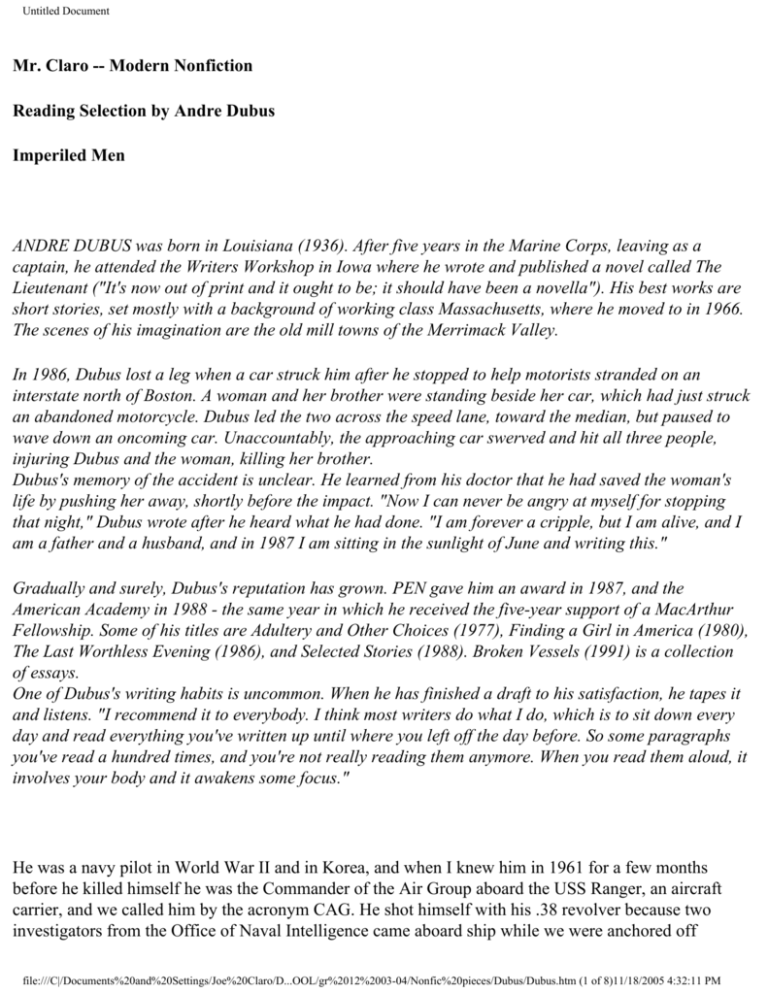
Untitled Document Mr. Claro -- Modern Nonfiction Reading Selection by Andre Dubus Imperiled Men ANDRE DUBUS was born in Louisiana (1936). After five years in the Marine Corps, leaving as a captain, he attended the Writers Workshop in Iowa where he wrote and published a novel called The Lieutenant ("It's now out of print and it ought to be; it should have been a novella"). His best works are short stories, set mostly with a background of working class Massachusetts, where he moved to in 1966. The scenes of his imagination are the old mill towns of the Merrimack Valley. In 1986, Dubus lost a leg when a car struck him after he stopped to help motorists stranded on an interstate north of Boston. A woman and her brother were standing beside her car, which had just struck an abandoned motorcycle. Dubus led the two across the speed lane, toward the median, but paused to wave down an oncoming car. Unaccountably, the approaching car swerved and hit all three people, injuring Dubus and the woman, killing her brother. Dubus's memory of the accident is unclear. He learned from his doctor that he had saved the woman's life by pushing her away, shortly before the impact. "Now I can never be angry at myself for stopping that night," Dubus wrote after he heard what he had done. "I am forever a cripple, but I am alive, and I am a father and a husband, and in 1987 I am sitting in the sunlight of June and writing this." Gradually and surely, Dubus's reputation has grown. PEN gave him an award in 1987, and the American Academy in 1988 - the same year in which he received the five-year support of a MacArthur Fellowship. Some of his titles are Adultery and Other Choices (1977), Finding a Girl in America (1980), The Last Worthless Evening (1986), and Selected Stories (1988). Broken Vessels (1991) is a collection of essays. One of Dubus's writing habits is uncommon. When he has finished a draft to his satisfaction, he tapes it and listens. "I recommend it to everybody. I think most writers do what I do, which is to sit down every day and read everything you've written up until where you left off the day before. So some paragraphs you've read a hundred times, and you're not really reading them anymore. When you read them aloud, it involves your body and it awakens some focus." He was a navy pilot in World War II and in Korea, and when I knew him in 1961 for a few months before he killed himself he was the Commander of the Air Group aboard the USS Ranger, an aircraft carrier, and we called him by the acronym CAG. He shot himself with his .38 revolver because two investigators from the Office of Naval Intelligence came aboard ship while we were anchored off file:///C|/Documents%20and%20Settings/Joe%20Claro/D...OOL/gr%2012%2003-04/Nonfic%20pieces/Dubus/Dubus.htm (1 of 8)11/18/2005 4:32:11 PM Untitled Document Jwakuni in Japan and gave the ship's captain a written report of their investigation of CAG's erotic life. CAG was a much-decorated combat pilot, and his duty as a commander was one of great responsibility. The ship's executive officer, also a commander, summoned CAG to his office, where the two investigators were, and told him that his choices were to face a general court-martial or to resign from the navy. Less than half an hour later CAG was dead in his stateroom. His body was flown to the United States; we were told that he did not have a family, and I do not know where he was buried. There was a memorial service aboard ship, but I do not remember it; I only remember a general sadness like mist in the passageways. I did not really know him. I was a first lieutenant then, a career marine; two years later I would resign and become a teacher. On the Ranger I was with the marine detachment; we guarded the planes' nuclear weapons stored below decks, ran the brig, and manned one of the antiaircraft gun mounts. We were fifty or so enlisted men and two officers among a ship's crew of about three thousand officers and men. The Air Group was not included in the ship's company. They came aboard with their planes for our sevenmonth deployment in the western Pacific. I do not remember the number of pilots and bombardiernavigators, mechanics and flight controllers, and men who worked on the flight deck, but there were plenty of all, and day and night you could hear planes catapulting off the front of the deck and landing on its rear. The flight deck was 1,052 feet long, the ship weighed 81,000 tons fully loaded, and I rarely felt its motion. I came aboard in May for a year of duty, and in August we left our port in San Francisco Bay and headed for Japan. I had driven my wife and three young children home to Louisiana, where they would stay during the seven months I was at sea, and every day I longed for them. One night on the voyage across the Pacific I sat in the wardroom drinking coffee with a lieutenant commander at one of the long tables covered with white linen. The wardroom was open all night because men were always working. The lieutenant commander told me that Soviet submarines tracked us, they recorded the sound of our propellers and could not be fooled by the sound of a decoy ship's propellers, and that they even came into San Francisco Bay to do this; our submarines did the same with Soviet carriers. He said that every time we tried in training exercises to evade even our own submarines we could not do it, and our destroyers could not track and stop them. He said, "So if the whistle blows we'll get a nuclear fish up our ass in the first thirty minutes. Our job is to get the birds in the air before that. They're going to Moscow." "Where will they land afterward?" "They won't. They know that." The voyage to Japan was five or six weeks long because we did not go directly to Japan; the pilots flew air operations. Gombat units are always training for war, but these men who flew planes, and the men in orange suits and ear protectors who worked on the flight deck during landings and takeoffs, were file:///C|/Documents%20and%20Settings/Joe%20Claro/D...OOL/gr%2012%2003-04/Nonfic%20pieces/Dubus/Dubus.htm (2 of 8)11/18/2005 4:32:11 PM Untitled Document enCAGing in something not at all as playful as marine field exercises generally were. They were imperiled. One pilot told me that from his fighter-bomber in the sky the flight deck looked like an aspirin tablet. On the passage to Japan I' became friendly with some pilots drinking coffee in the wardroom, and I knew what CAG looked like because he was CAG. He had dark skin and alert eyes, and he walked proudly. Then in Japan I sometimes drank with young pilots. I was a robust twenty-fiveyear-old, one of two marine officers aboard ship, and I did not want to be outdone at anything by anyone. But I could not stay with the pilots; I had to leave them in the bar, drinking and talking and laughing, and make my way back to the ship to sleep and wake with a hangover. Next day the pilots flew; if we did not go to sea, they flew from a base on land. Once I asked one of them how he did it. "The pure oxygen. Soon as you put on the mask, your head clears." It was not simply the oxygen, and I did not understand any of these wild, brave, and very efficient men until years later when I read Tom Wolfe's The Right Stuff. It was on that same tour that I saw another pilot die. I worked below decks with the marine detachment, but that warm gray afternoon the entire ship was in a simulated condition of war, and my part was to stand four hours of watch in a small turret high above the ship. I could move the turret in a circular way by pressing a button, and I looked through binoculars for planes or ships in the 180-degree arc of our port side. On the flight deck planes were taking off; four could do this in quick sequence. Two catapults launched planes straight off the front of the ship, and quickly they rose and climbed. The third and fourth catapults were on the port side where the flight deck angled sharply out to the left, short of the bow. From my turret I looked down at the ship's bridge and the flight deck. A helicopter flew low near the ship, and planes were taking off. On the deck were men in orange suits and ear protectors; on both sides of the ship, just beneath the flight deck, were nets for these men to jump into, to save themselves from being killed by a landing plane that veered or skidded or crashed. One night I'd inspected a marine guarding a plane on the flight deck; we had a sentry there because the plane carried a nuclear bomb. I stepped from a hatch into the absolute darkness of a night at sea and into a strong wind that lifted my body with each step. I was afraid it would lift me off the deck and hurl me into the sea, where I would tread water in that great expanse and depth while the ship went on its way; tomorrow they would learn that I was missing. I found the plane and the marine; he stood with one arm around the cable that held the wing to the deck. In the turret I was facing aft when it happened: Men in orange were at the rear of the flight deck, then they sprinted forward, and I rotated my turret toward the bow and saw a plane in the gray sea and an orange-suited pilot lying facedown in the water, his parachute floating beyond his head, moving toward the rear of the ship. The plane had dropped off the port deck and now water covered its wing, then its cockpit, and it sank. The pilot was behind the ship; his limbs did not move, his face was in the sea, and his parachute was filling with water and starting to sink. The helicopter hovered low and a sailor on a file:///C|/Documents%20and%20Settings/Joe%20Claro/D...OOL/gr%2012%2003-04/Nonfic%20pieces/Dubus/Dubus.htm (3 of 8)11/18/2005 4:32:11 PM Untitled Document rope descended from it; he wore orange, and I watched him coming down and the pilot floating and the parachute sinking beneath the waves. There was still some length of parachute line remaining when the sailor reached the pilot; he grabbed him; then the parachute lines tightened their pull and drew the pilot down. There was only the sea now beneath the sailor on the rope. Then he ascended. I shared a stateroom with a navy lieutenant, an officer of medical administration, a very tall and strong man from Oklahoma. He had been an enlisted man, had once been a corpsman aboard a submarine operating off the coast of the Soviet Union, and one night their periscope was spotted, destroyers came after them, and they dived and sat at the bottom and listened by sonar to the destroyers' sonar trying to find them. He told me about the sailor who had tried to save the pilot. In the dispensary they gave him brandy, and the sailor wept and said he was trained to do that job, and this was his first time, and he had failed. Of course he had not failed. No man could lift another man attached to a parachute filled with water. Some people said the helicopter had not stayed close enough to the ship while the planes were taking off. Some said the pilot was probably already dead; his plane dropped from the ship, and he ejected himself high into the air, but not high enough for his parachute to ease his fall. This was all talk about the mathematics of violent death; the pilot was killed because he flew airplanes from a ship at sea. He was a lieutenant commander, and I knew his face and name. As he was being catapulted, his landing gear on the left side broke off and his plane skidded into the sea. He was married; his widow had been married before, also to a pilot who was killed in a crash. I wondered if it were her bad luck to meet only men who flew; years later I believed that whatever in their spirits made these men fly also drew her to them. I first spoke to CAG at the officers' club at the navy base in Yokosuka. The officers of the Air Group hosted a party for the officers of the ship's company. We wore civilian suits and ties, and gathered at the club to drink. There were no women. The party was a matter of protocol, probably a tradition among pilots and the officers of carriers; for us young officers it meant getting happily drunk. I was doing this with pilots at the bar when one of them said, "Let's throw CAG into the pond." He grinned at me, as I looked to my left at the small shallow pond with pretty fish in it; then I looked past the pond at CAG, sitting on a soft leather chair, a drink in his hand, talking quietly with two or three other commanders sitting in soft leather chairs. All the pilots with me were grinning and saying yes, and the image of us lifting CAG from his chair and dropping him into the water gave me joy, and I put my drink on the bar and said, "Let's go." I ran across the room to CAG, grabbed the lapels of his coat, jerked him is up from his chair, and saw his drink spill onto his suit; then I fell backward to the floor, still holding his lapels, and pulled him down on top of me. There was no one else with me. He was not angry yet, but I was a frightened fool. I released his lapels and turned my head and looked back at the laughing pilots. Out of my vision the party was loud, hundreds of drinking officers who had not seen this, and CAG sounded only puzzled when he said, "What's going on?" file:///C|/Documents%20and%20Settings/Joe%20Claro/D...OOL/gr%2012%2003-04/Nonfic%20pieces/Dubus/Dubus.htm (4 of 8)11/18/2005 4:32:11 PM Untitled Document He stood and brushed at the drink on his suit, watching me get up from the floor. I stood not quite at attention but not at ease either. I said, "Sir, I'm Marine Lieutenant Dubus. Your pilots fooled me." I nodded toward them at the bar, and CAG smiled. "They said, 'Let's throw CAG into the pond.' But, sir, the joke was on me." He was still smiling. "I'm very sorry, sir." "That's all right, Lieutenant." "Can I get the Commander another drink, sir?" "Sure," he said, and told me what he was drinking, and I got it from the bar, where the pilots were redfaced and happy, and brought it to CAG, who was sitting in his chair again with the other commanders. He smiled and thanked me, and the commanders smiled; then I returned to the young pilots and we all laughed. Until a few months later, on the day he killed himself, the only words I spoke to CAG after the party were greetings. One night I saw him sitting with a woman in the officers' club, and I wished him good evening. A few times I saw him in the ship's passageways; I recognized him seconds before the features of his face were clear: He had a graceful, athletic stride that dipped his shoulders. I saluted and said, "Good morning, sir" or "Good afternoon, sir." He smiled as he returned my salute and greeting, his eyes and voice mirthful, and I knew that he was seeing me again pulling him out of his chair and down to the floor, then standing to explain myself and apologize. I liked being a memory that gave him sudden and passing amusement. On a warm sunlit day we were anchored off Iwakuni, and I planned to go with other crew members on a bus to Hiroshima. I put on civilian clothes and went down the ladder to the boat that would take us ashore. I was not happily going to Hiroshima; I was going because I was an American, and I felt that I should look at it and be in it. I found a seat on the rocking boat, then saw CAG in civilian clothes coming down the ladder. There were a few seats remaining, and he chose the one next to me. He asked me where I was going, then said he was going to Hiroshima, too. I was relieved and grateful; while CAG was flying planes in World War II, I was a boy buying savings stamps and bringing scrap metal to file:///C|/Documents%20and%20Settings/Joe%20Claro/D...OOL/gr%2012%2003-04/Nonfic%20pieces/Dubus/Dubus.htm (5 of 8)11/18/2005 4:32:11 PM Untitled Document school. On the bus he would talk to me about war, and in Hiroshima I would walk with him and look with him, and his seasoned steps and eyes would steady mine. Then from the ship above us the officer of the deck called down, "CAG?" CAG turned and looked up at him, a lieutenant junior grade in white cap and short-sleeved shirt and trousers. "Sir, the executive officer would like to see you." I do not remember what CAG said to me. I only remember my disappointment when he told the boat's officer to go ashore without him. All I saw in CAG's face was the look of a man called from rest back to his job. He climbed the ladder, and soon the boat pulled away. Perhaps when I reached Hiroshima CAG was already dead; I do not remember the ruins at ground zero or what I saw in the museum. I walked and looked, and stood for a long time at a low arch with an open space at the ground, and in that space was a stone box that held the names of all who died on the day of the bombing and all who had died since because of the bomb. That night I ate dinner ashore, then rode the boat to the ship, went to my empty room, climbed to my upper bunk, and slept for only a while, till the quiet voice of my roommate woke me: "The body will be flown to Okinawa." I looked at him standing at his desk and speaking into the telephone. "Yes. A .38 in the temple. Yes." I turned on my reading lamp and watched him put the phone down. He 30 was sad, and he looked at me. I said, "Did someone commit suicide?" "CAG." "CAG?" I sat up. file:///C|/Documents%20and%20Settings/Joe%20Claro/D...OOL/gr%2012%2003-04/Nonfic%20pieces/Dubus/Dubus.htm (6 of 8)11/18/2005 4:32:11 PM Untitled Document "The ONI investigated him." Then I knew what I had not known I knew, and I said, "Was he a homosexual?" "Yes." My roommate told me the executive officer had summoned CAG to his office, shown him the report, and told him that he could either resign or face a general court-martial. Then CAG went to his room. Fifteen minutes later the executive officer phoned him; when he did not answer, the executive officer and the investigators ran to his room. He was on his bunk, shot in the right temple, his pilot's .38 revolver in his hand. His eyelids fluttered; he was unconscious but still alive, and he died from bleeding. "They ran?" I said. "They ran to his room?" Ten years later one of my shipmates came to visit me in Massachusetts; we had been civilians for a long time. In my kitchen we were drinking beer, and he said, "I couldn't tell you this aboard ship, because I worked in the legal office. They called CAG back from that boat you were on because he knew the ONI was aboard. His plane was on the ground at the base of Iwakuni. They were afraid he was going to fly it and crash into the sea and they'd lose the plane." All three thousand of the ship's crew did not mourn. Not every one of 40 the hundreds of men in the Air Group mourned. But the shock was general and hundreds of men did mourn, and each morning we woke to it, and it was in our talk in the wardroom and in the passageways. In the closed air of the ship it touched us, and it lived above us on the flight deck and in the sky. One night at sea a young pilot came to my room; his face was sunburned and sad. We sat in desk chairs, and he said, "The morale is very bad now. The whole Group. It's just shot." "Did y'all know about him?" "We all knew. We didn't care. We would have followed him into hell." Yes, they would have followed him; they were ready every day and every night to fly with him from a doomed ship and follow him to Moscow, to perish in their brilliant passion. file:///C|/Documents%20and%20Settings/Joe%20Claro/D...OOL/gr%2012%2003-04/Nonfic%20pieces/Dubus/Dubus.htm (7 of 8)11/18/2005 4:32:11 PM Untitled Document AFTERWORD In June of 1993, Harper's printed Andre Dubus's reminiscence,from his Marine Corps days, only a few months after President Clinton outraged the opposition when he tried lifting the ban against gays in the military. Doubtless the controversy recalled this tragic story to Andre Dubus. Dubus holds nothing back from the reader. In the first sentence of the first paragraph we learn that a navy pilot, veteran and leader, committed suicide. At the end of the second sentence we learn that he killed himself because his "erotic life" was exposed; we do not need great sophistication to guess the nature of the erotic life. No one killed himself over the Tailhook scandal. Making an argument without appearing to argue, Dubus establishes CAG'S manliness or heroism. Paragraph 2 puts the Air Group in its special place. Paragraph 3, and the two lines of dialogue that come out of it, establish the routine heroism expected of CAG and his pilots. Ironically, it is a courage made manifest by suicide presumed in the line of duty. Such a notion is not the only irony in the paragraph. The idiom describing the carrier's fate, in a Russian attack, alludes in its slang to sodomy: "If the whistle blows we'll get a nuclear fish up our ass in the first thirty minutes." In paragraph 9, Dubus tells the story of how he "saw another pilot die." In the story of this pilot's death, in the guilt and regret of his would-be savior, and even in the sinking of his airplane under the waves, Dubus foreshadows details toward the end of the story. See the last words of paragraph 39: "They were afraid he was going to fly it and crash into the sea and they'd lose the plane." For that matter, after the suicide by a .38 pistol, the morale of the Group is low; as a young pilot puts it, "It's just shot." BOOKS AVAILABLE IN PAPERBACK Adultery and Other Ghoices. Boston: David R. Godine. Short stories. Broken Vessels. Boston: David R. Godine. Essays. Finding a Girl in America. Boston: David R. Godine. Short stories. Selected Stories. New York: Random House-Vintage. Short stories. Separate Flights. Boston: David R. Godine. Short stories. The Times Are Never So Bad. Boston: David R. Godine. Short stories. file:///C|/Documents%20and%20Settings/Joe%20Claro/D...OOL/gr%2012%2003-04/Nonfic%20pieces/Dubus/Dubus.htm (8 of 8)11/18/2005 4:32:11 PM
